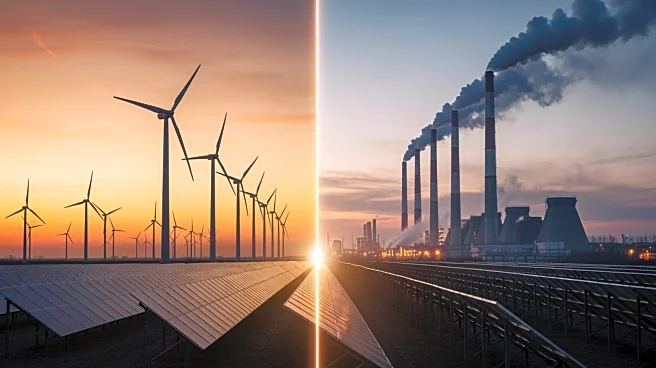What's Happening?
As COP30 progresses in Brazil, the global energy transition landscape is marked by significant divergence among major economies. The conference, which follows the landmark Paris climate agreement of 2015,
reveals a fractured approach to climate policies. The United States, China, and Europe are pursuing distinct energy strategies, influenced by regional economic and political realities. China, the largest energy consumer and CO2 emitter, is focusing on reducing its reliance on energy imports by investing in domestic energy sources and green technologies. The United States, under President Trump's administration, has withdrawn from the Paris agreement, emphasizing fossil fuel production. Meanwhile, Europe, once a strong advocate for the energy transition, is grappling with the consequences of the energy crisis triggered by Russia's invasion of Ukraine, leading to a reevaluation of its climate policies.
Why It's Important?
The divergent paths in the energy transition among the world's largest economies have significant implications for global climate efforts. China's leadership in renewable energy technologies positions it as a key player in the transition, but its continued reliance on coal poses challenges. The U.S. focus on fossil fuels under President Trump could slow the global shift towards clean energy, affecting international climate goals. Europe's energy crisis highlights the risks of dependency on single energy suppliers and the complexities of balancing economic stability with climate commitments. These developments underscore the challenges of achieving a unified global approach to climate change, with economic and strategic interests often taking precedence over collective action.
What's Next?
The future of the global energy transition will likely be shaped by ongoing geopolitical and economic dynamics. China's continued investment in renewables and green technologies may drive further advancements, while the U.S. energy policy could shift with future administrations. Europe's response to its energy crisis will be crucial in determining its climate strategy moving forward. The outcomes of COP30 and subsequent international climate negotiations will be pivotal in addressing these challenges and fostering cooperation among nations. Stakeholders, including governments, businesses, and civil society, will need to navigate these complexities to advance the energy transition and meet climate targets.
Beyond the Headlines
The fractured approach to the energy transition raises ethical and strategic questions about global cooperation in addressing climate change. The reliance on fossil fuels by major economies like the U.S. and the geopolitical implications of energy dependencies highlight the need for a more integrated and sustainable approach. The role of emerging technologies and innovation in bridging these gaps will be critical. Additionally, the impact of these divergent paths on developing countries and their ability to participate in the energy transition warrants attention, as it could exacerbate existing inequalities and hinder global progress.









